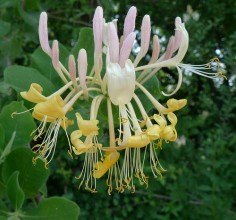Ekstrakt z wiciokrzewu do ubrań anty-UV
Ekstrakt z wiciokrzewu można wykorzystać jako wysoce skuteczną naturalną powłokę w ubraniach mających chronić ludzi przed wpływem szkodliwego promieniowania ultrafioletowego.
Ren-Cheng Tang i Sha-Sha Sun podkreślają, że rośnie rzesza konsumentów, którzy chroniąc się przed nowotworami skóry i przedwczesnym starzeniem, chętnie korzystają z dobrodziejstw specjalnie zaprojektowanej garderoby. Naturalne powłoki anty-UV mają sporo plusów. Jednym z podstawowych jest bardziej przyjazny środowisku proces produkcyjny.
Autorzy omawianego studium opowiadają, że w medycynie chińskiej wiciokrzew jest od wieków wykorzystywany w leczeniu przeziębień i gorączki. Im jednak zależało na ustaleniu, czy wyciąg z wiciokrzewu zwiększy w przypadku wełny ilość eliminowanego promieniowania ultrafioletowego. Odkryli, że wełna pokryta ekstraktem z wiciokrzewu sprawdza się lepiej od zwykłej wełny, zapewniając tkaninie wysoki filtr UPF (UV protection factor). Co ważne, ekstrakt jest wytrzymały i pozostaje aktywny nawet po długiej ekspozycji na słońce i praniu.




Komentarze (1)
mikroos, 30 sierpnia 2011, 10:02
Cytat z rewelacyjnej notki w tym blogu: http://www.science20.com/emergent_fool/blog/cancer’s_inconvenient_truths (lub tłumaczenie notki: http://translate.google.com/translate?js=n&prev=_t&hl=pl&ie=UTF-8&layout=2&eotf=1&sl=en&tl=pl&u=http%3A%2F%2Fwww.science20.com%2Femergent_fool%2Fblog%2Fcancer%E2%80%99s_inconvenient_truths )
Up until a few years ago one of the Prevent Cancer Foundation’s Top 7 Prevention Tips was to “always wear sunscreen” when going outdoors.
Unfortunately, if everyone followed this advice, we now believe avoiding the sun would cause 10 times the cancer deaths that sunscreen would prevent. Here’s why:
Sunlight is critical for your natural cancer immunity (amongst other things)
And while it’s true that UVA radiation from the sun causes genetic damage in the skin, the UVB which also comes from the sun ameliorates the effect of that damage.
Sunscreen blocks out both UVA and UVB
An important detail that often gets lost is that while sunlight increases your chances of getting certain kinds of skin cancers, sunlight protects against all kinds of cancers.
It is currently easier to detect pre-cancerous growths on the skin’s surface than inside the body.
The ratio of solid cancers to skin cancers is over 10:1.
Moreover, the most aggressive forms of skin cancers are those that are not initiated by UVA radiation, and which often are found on parts of the skin not exposed to the sun, such as on the scalp.
Bottom line: which is riskier for your health, getting too much sun or not enough?